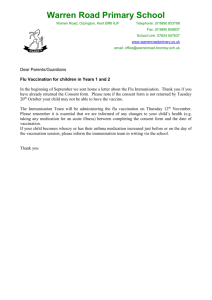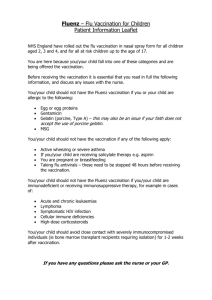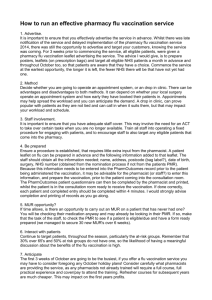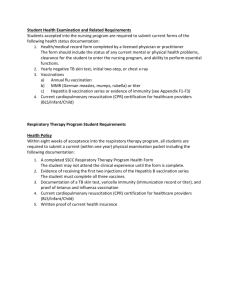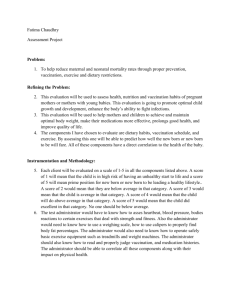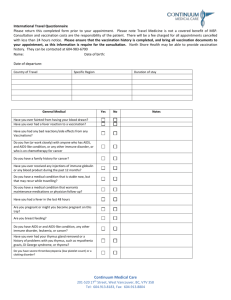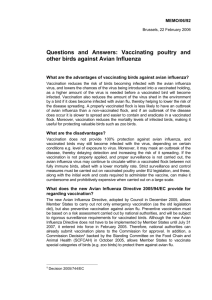One of the great medical advances of our age has been the
advertisement
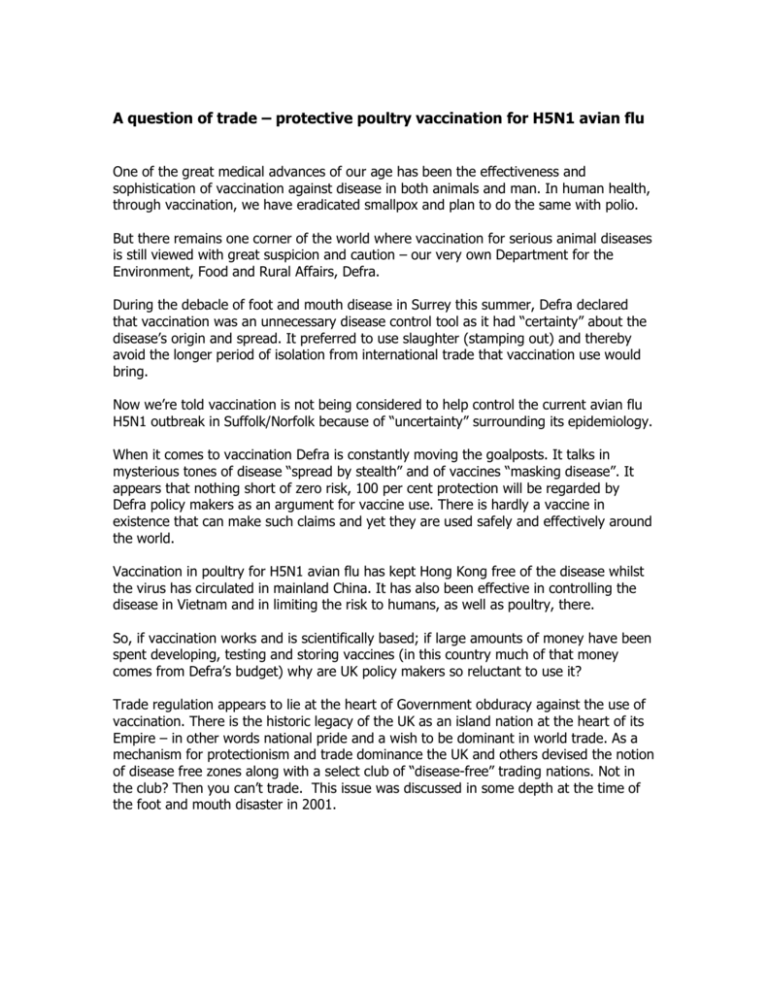
A question of trade – protective poultry vaccination for H5N1 avian flu One of the great medical advances of our age has been the effectiveness and sophistication of vaccination against disease in both animals and man. In human health, through vaccination, we have eradicated smallpox and plan to do the same with polio. But there remains one corner of the world where vaccination for serious animal diseases is still viewed with great suspicion and caution – our very own Department for the Environment, Food and Rural Affairs, Defra. During the debacle of foot and mouth disease in Surrey this summer, Defra declared that vaccination was an unnecessary disease control tool as it had “certainty” about the disease’s origin and spread. It preferred to use slaughter (stamping out) and thereby avoid the longer period of isolation from international trade that vaccination use would bring. Now we’re told vaccination is not being considered to help control the current avian flu H5N1 outbreak in Suffolk/Norfolk because of “uncertainty” surrounding its epidemiology. When it comes to vaccination Defra is constantly moving the goalposts. It talks in mysterious tones of disease “spread by stealth” and of vaccines “masking disease”. It appears that nothing short of zero risk, 100 per cent protection will be regarded by Defra policy makers as an argument for vaccine use. There is hardly a vaccine in existence that can make such claims and yet they are used safely and effectively around the world. Vaccination in poultry for H5N1 avian flu has kept Hong Kong free of the disease whilst the virus has circulated in mainland China. It has also been effective in controlling the disease in Vietnam and in limiting the risk to humans, as well as poultry, there. So, if vaccination works and is scientifically based; if large amounts of money have been spent developing, testing and storing vaccines (in this country much of that money comes from Defra’s budget) why are UK policy makers so reluctant to use it? Trade regulation appears to lie at the heart of Government obduracy against the use of vaccination. There is the historic legacy of the UK as an island nation at the heart of its Empire – in other words national pride and a wish to be dominant in world trade. As a mechanism for protectionism and trade dominance the UK and others devised the notion of disease free zones along with a select club of “disease-free” trading nations. Not in the club? Then you can’t trade. This issue was discussed in some depth at the time of the foot and mouth disaster in 2001. Veterinary historian Abigail Woods’ 2001 analysis of national thinking regarding serious animal contagion is as true for avian flu in 2007 as it was for foot and mouth then. “Britain has always been intensely proud of her ability to abolish disease. Our island status has meant that several diseases, once eliminated by stamping out have been permanently kept out of the country eg cattle plague, sheep pox, rabies. This geographical 'difference' has been continually emphasised as reason why disease elimination is achievable in Britain but rather more difficult elsewhere, and has been used by Government to justify the rejection of preferred continental means of disease control in favour of a stamping out policy. However, this 'island' status has been increasingly undermined by the expansion of free European and world trade and widespread tourism. This encourages the introduction of 'foreign' substances into Britain. Powers to restrict such moves are extremely limited and inspection as a means of control can never approach 100% efficacy. The confidence in British isolation and its implications for disease control measures is therefore less justified than in the past. In addition the conditions within the nation have undergone profound changes. Farm size and livestock holdings have vastly increased throughout the 20th Century whilst the numbers of people involved in agriculture has plummeted. Agri-business has forced smaller producers out of the market while economies of scale and marketing practices have encouraged the nationwide movement of livestock.” In other words, large-scale agribusiness is a generator and disseminator of serious, trans-boundary diseases. Nonetheless, it is not vaccination but stamping out (slaughter) alongside bio-security measures that remain at the heart of the regulation of trade in livestock and products whenever a serious trans-boundary disease (as defined in the list A of the World Veterinary Body, the OIE) breaks out. Bio-security measures are an essential element of any strategy, but the slaughter element is as outdated as British imperialism. The OIE accepts that vaccination can be used against A list diseases, including avian flu, but it enforces such draconian measures to keep vaccinated and non-vaccinated apart that there is extreme reluctance on the part of individual countries to follow the vaccination path. There is no human health justification for this, no veterinary justification and no consumer justification as vaccinated livestock products are bought and sold without a second thought everywhere in the world. The only rationale that is offered is that the disease might spread “by stealth” through vaccinated birds catching avian flu but not showing clinical symptoms. When vaccination is used – as in Holland during 2006 - other nations and individual commercial enterprises cry with horror and invoke protectionist rules, refusing to import vaccinated poultry and poultry produce. Or simply they make a commercial decision which discriminates against vaccinated products. In the UK one of the great hangovers from the foot and mouth disaster of 2001 is the questionable attitude of food processors and large retailers to the hypothetical question – would they deal in avian flu vaccinated birds and produce or would they refuse on the basis that consumers are fearful of vaccinated poultry and won’t buy it? In fact, all poultry is routinely vaccinated against a range of diseases. Treatments against avian flu present no additional consumer risks. There is perhaps some light at the end of the tunnel. Defra is now preparing a voluntary vaccination regime for the control of another serious, notifiable disease – Bluetongue. This presents a precedent which could be applied to a programme of preventive vaccination for avian flu H5N1 – we can but hope. ends
